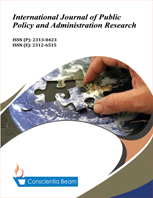Tax progressivity and its influence on tax collection levels in Mexico, 1992-2016
DOI:
https://doi.org/10.18488/74.v11i2.3743Abstract
This study aims to examine the impact of income tax and VAT progressivity on Mexico’s tax collection. In Mexico, tax collection has persistently remained at notably low levels, attributed in part to the perceived inequity within the tax system. Initially, we compute the progressivity of income tax and VAT to ascertain the average percentage increase in these taxes relative to a 100% rise in income. Results indicate income tax's progressive nature, contrasting with VAT's regressive pattern. Subsequently, employing a time-series model, we analyze the influence of income tax and VAT progressivity on tax collection. Our findings reveal a positive correlation between fiscal progressiveness and tax collection levels over both short and long terms. These findings offer practical implications, suggesting that leveraging the insights from this research could fortify tax policies, thereby enhancing tax revenues and contributing to improved income distribution. The analysis underscores the importance of considering the level of progressivity in income tax and VAT rates for enhancing tax collection in Mexico. By leveraging progressive taxation policies, policymakers can potentially boost tax revenues while promoting a more equitable distribution of income. Furthermore, an increase in tax collection can potentially support public programs and services benefiting society as a whole, thus enhancing overall welfare.

